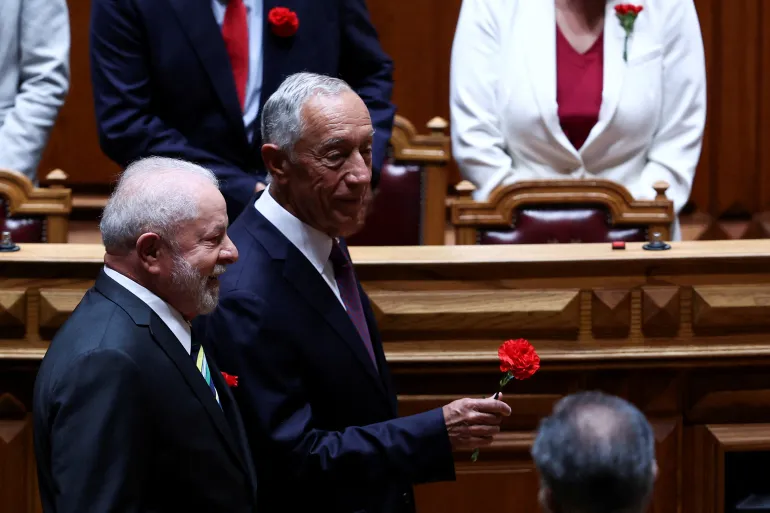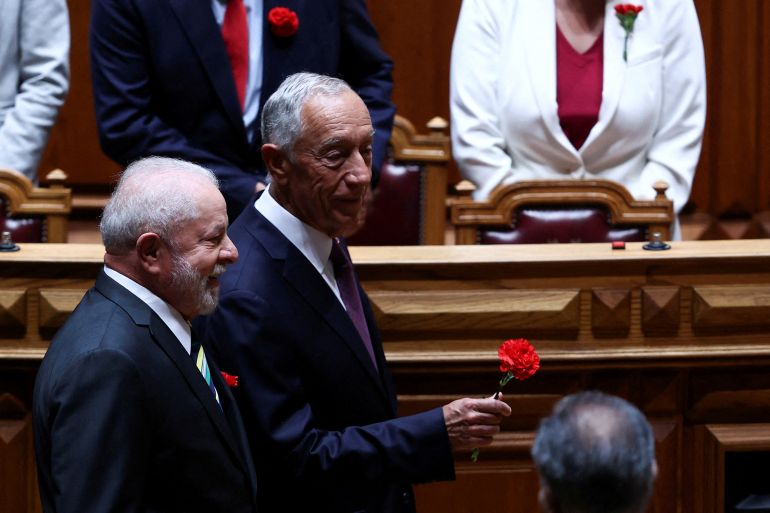Portugal should take ‘responsibility’ for slavery, president says

Marcelo Rebelo de Sousa is the first Portuguese leader to suggest an apology for his country’s key role in the transatlantic slave trade.

Portugal’s President Marcelo Rebelo de Sousa said his country should take responsibility and apologise for its role in the transatlantic slave trade, the first time a Portuguese leader has suggested offering a national apology.
From the 15th to the 19th century, 6 million Africans were kidnapped and forcibly transported across the Atlantic by Portuguese vessels and sold into slavery, primarily to work on plantations in Brazil.
Rebelo de Sousa said on Tuesday that the country should go beyond just an apology, though he did not offer any specifics. The president was speaking at Portugal’s annual commemoration of the 1974 “Carnation” revolution, which toppled the country’s dictatorial Estado Novo system.
“Apologising is sometimes the easiest thing to do: you apologise, turn your back and the job is done,” the president said, adding that Portugal should “assume responsibility” for its past to build a better future.
Rebelo de Sousa made his remarks after Brazilian President Luiz Inacio Lula da Silva, who was in Portugal on his first visit to Europe since assuming office, addressed the Portuguese parliament. Brazil gained independence from Portugal in 1822.
He said the colonisation of Brazil also had positive factors, such as the spread of Portuguese language and culture.
“(But) on the bad side, the exploitation of Indigenous people… slavery, the sacrifice of the interests of Brazil and Brazilians,” he said.
Dutch PM apologises for Netherlands’ role in slavery
Brazil’s human rights minister, Silvio Almeida, said Rebelo de Sousa had taken an “extremely important” step.
“We continue to suffer in Brazil the effects of a legacy of slavery,” Almeida said in a statement.
“Recognising the exploitation of millions of enslaved people for more than 300 years is a step towards moving towards a less unequal society.”
The Council of Europe’s commissioner for human rights told Portugal in 2021 that it should do more to face up to its colonial past and role in the transatlantic slave trade as a way to combat contemporary racism and discrimination in the country.
“It is important to shed light on the historically repressive structures of colonialism, ingrained racist biases and their present-day ramifications”, Commissioner Dunja Mijatović said at the time, noting that including such history in school curricula would be useful.
Little is currently taught in Portugal’s schools about the country’s central role in the slave trade.
From the 16th century, Portugal established sugar plantations – then the world’s most prized commodity – in Brazil, using slaves who were shipped across the Atlantic from the west coast of Africa.
The transatlantic slave trade became an extremely lucrative international enterprise involving all of Europe’s colonising power, with the British, Dutch, French and Spanish joining Portugal in the trade in people.
Brazil Black Awareness Month: Rights struggle persists 30 years on
Paula Cardoso, founder of the Afrolink online platform for Black professionals in Portugal, said the president’s remarks were “symbolic” but important as they brought the issue to the table.
“(But) I would have liked to hear something more concrete from the president,” Cardoso told Reuters. “To have some impact, these reflections… have to be accompanied by measures and commitments.”
Reparations and public policies to fight inequalities caused by Portugal’s past are essential, Cardoso said.







